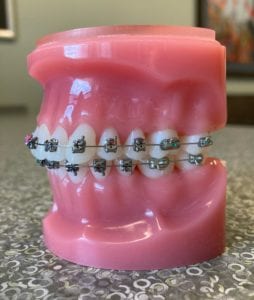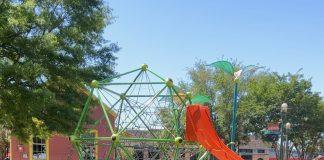Disclosure :: This post was sponsored by and written by Dr. Melanie Fowler.
Top Tips For Handling Life with Braces Like a Pro!
Getting braces is exciting, especially for kids. The all-important questions of “what will I look like with braces?” and “how will my braces feel?” have been answered, and then the reality of living with braces hits you.
What can I eat and what can’t I eat? What about soreness? How do I take care of my braces? What about playing sports? Read on to get a quick primer on how to handle life with braces like a professional!
Eating with Braces
Don’t worry, you’ll be eating popcorn and snacking on potato chips again in no time! However, before you can start enjoying some of the treats you love, you will need to take special care to avoid any foods that could damage your new appliances. It’s also a good idea to avoid sugary foods in-between meals. Drinking water is important to help rinse away food and sugar and to help maintain a balanced pH in your mouth. Too much sugar and acid can cause cavities and stains around your braces.
Foods to avoid with braces:
- Crunchy foods — popcorn, chips, ice
- Sticky foods — caramel candies, chewing gum, licorice
- Hard foods — nuts, hard candies
- Foods that require biting into — corn on the cob, apples, carrots
Foods you CAN eat with braces:
- Dairy —cheese, pudding, milk-based drinks
- Breads — soft tortillas, pancakes, muffins without nuts
- Grains — pasta, rice
- Meats/poultry — grilled chicken, meatballs, lunch meats
- Seafood — tuna, salmon, crab cakes
- Vegetables — mashed potatoes, steamed spinach, beans
- Fruits — applesauce, strawberries, bananas
- Treats — ice cream without nuts, milkshakes, Jell-O
Soreness Caused from Braces and Appliances
When you first get your braces, you may notice that your teeth and mouth feel a little tender or sore. This is perfectly normal and your mouth will not be sore forever! To relieve the pain, we recommend taking an over-the-counter pain reliever like ibuprofen or acetaminophen. It is also not uncommon for your lips, cheeks, and tongue to become irritated for one to two weeks as they toughen and become used to the braces. You can use wax to help cover especially pokey or rough areas on the appliances.
Taking Care of Your Appliances
Damaged appliances can increase the length of your treatment process, so be sure to take care of all your appliances. Your teeth and jaw can only move into their correct positions if you consistently wear the rubber bands, headgear, retainer, or other appliances prescribed by your doctor.
Brushing and Flossing
One of the most important jobs of an orthodontic patient is to keep the teeth and braces super clean! Any type of toothbrush, along with fluoride toothpaste, can be used, however, an electric toothbrush, like a Sonicare, is more beneficial for most patients. The best advice is to make sure you brush for a minimum of three times per day, for two minutes each time. Two minutes sounds like a short amount of time, but it makes all the difference! Set a timer, or listen to your favorite song while you brush! The daily use of floss is very important, and a Water-pik can be a great addition to your routine. Removing food and plaque is essential to prevent cavities or stains from forming.
Playing Sports with Braces
You can still play sports even while undergoing orthodontic treatment! If you do play sports, it’s recommended that you wear a mouthguard to protect your teeth and your appliances. In case of a sports emergency, be sure to immediately check your mouth and appliances for damage. If you notice any loose teeth or appliance damage, it’s important to contact your orthodontist right away.
Having braces will definitely require more time for cleaning and maintenance but the end result of a beautiful and functional smile will be well worth the extra effort!!
Learn more about Dr. Melanie Fowler and her practice using the links below.
Website | Facebook | Instagram | Twitter
About the author::
 Dr. Melanie Fowler is a board-certified orthodontist with offices in Lafayette and New Iberia. She has owned her own practice for more than fifteen years, and is also a Clinical Associate Professor at the LSU School of Dentistry Department of Orthodontics in New Orleans. She has a passion for teaching and is the course director for the Orthodontic Journal Club and manages Orofacial Anomaly clinic patients with the residents. She is active in the American Association of Orthodontists, is a past President of the Louisiana Association of Orthodontists, and past Director on the Board of the Southwestern Society of Orthodontists. Melanie currently serves as the 2020-2021 President of Junior League of Lafayette. She is also a graduate of Leadership Lafayette XXIV and is a past recipient of a Top 20 under 40 award.
Dr. Melanie Fowler is a board-certified orthodontist with offices in Lafayette and New Iberia. She has owned her own practice for more than fifteen years, and is also a Clinical Associate Professor at the LSU School of Dentistry Department of Orthodontics in New Orleans. She has a passion for teaching and is the course director for the Orthodontic Journal Club and manages Orofacial Anomaly clinic patients with the residents. She is active in the American Association of Orthodontists, is a past President of the Louisiana Association of Orthodontists, and past Director on the Board of the Southwestern Society of Orthodontists. Melanie currently serves as the 2020-2021 President of Junior League of Lafayette. She is also a graduate of Leadership Lafayette XXIV and is a past recipient of a Top 20 under 40 award.


















